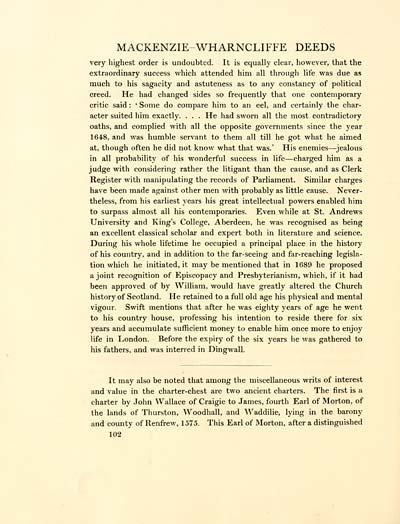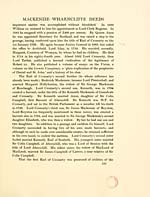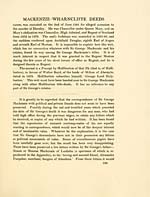Download files
Complete book:
Individual page:
Thumbnail gallery: Grid view | List view

MACKENZIE-WHARNCLIFFE DEEDS
very highest order is undoubted. It is equally clear, however, that the
extraordinary success which attended him all through life was due as
much to his sagacity and astuteness as to any constancy of political
creed. He had changed sides so frequently that one contemporary
critic said : ' Some do compare him to an eel, and certainly the char-
acter suited him exactly. . . . He had sworn all the most contradictory
oaths, and complied with all the opposite governments since the year
1648, and was humble servant to them all till he got what he aimed
at, though often he did not know what that was.' His enemies — jealous
in all probability of his wonderful success in life — charged him as a
judge with considering rather the litigant than the cause, and as Clerk
Register with manipulating the records of Parliament. Similar charges
have been made against other men with probably as little cause. Never-
theless, from his earliest years his great intellectual powers enabled him
to surpass almost all his contemporaries. Even while at St. Andrews
University and King's College, Aberdeen, he was recognised as being
an excellent classical scholar and expert both in literature and science.
During his whole lifetime he occupied a principal place in the history
of his country, and in addition to the far-seeing and far-reaching legisla-
tion which he initiated, it may be mentioned that in 1689 he proposed
a joint recognition of Episcopacy and Presbyterianism, which, if it had
been approved of by William, would have greatly altered the Church
history of Scotland. He retained to a full old age his physical and mental
vigour. Swift mentions that after he was eighty years of age he went
to his country house, professing his intention to reside there for six
years and accumulate sufficient money to enable him once more to enjoy
life in London. Before the expiry of the six years he was gathered to
his fathers, and was interred in Dingwall.
It may also be noted that among the miscellaneous writs of interest
and value in the charter-chest are two ancient charters. The first is a
charter by John Wallace of Craigie to James, fourth Earl of Morton, of
the lands of Thurston, Woodhall, and Waddilie, lying in the barony
and county of Renfrew, 1575. This Earl of Morton, after a distinguished
102
very highest order is undoubted. It is equally clear, however, that the
extraordinary success which attended him all through life was due as
much to his sagacity and astuteness as to any constancy of political
creed. He had changed sides so frequently that one contemporary
critic said : ' Some do compare him to an eel, and certainly the char-
acter suited him exactly. . . . He had sworn all the most contradictory
oaths, and complied with all the opposite governments since the year
1648, and was humble servant to them all till he got what he aimed
at, though often he did not know what that was.' His enemies — jealous
in all probability of his wonderful success in life — charged him as a
judge with considering rather the litigant than the cause, and as Clerk
Register with manipulating the records of Parliament. Similar charges
have been made against other men with probably as little cause. Never-
theless, from his earliest years his great intellectual powers enabled him
to surpass almost all his contemporaries. Even while at St. Andrews
University and King's College, Aberdeen, he was recognised as being
an excellent classical scholar and expert both in literature and science.
During his whole lifetime he occupied a principal place in the history
of his country, and in addition to the far-seeing and far-reaching legisla-
tion which he initiated, it may be mentioned that in 1689 he proposed
a joint recognition of Episcopacy and Presbyterianism, which, if it had
been approved of by William, would have greatly altered the Church
history of Scotland. He retained to a full old age his physical and mental
vigour. Swift mentions that after he was eighty years of age he went
to his country house, professing his intention to reside there for six
years and accumulate sufficient money to enable him once more to enjoy
life in London. Before the expiry of the six years he was gathered to
his fathers, and was interred in Dingwall.
It may also be noted that among the miscellaneous writs of interest
and value in the charter-chest are two ancient charters. The first is a
charter by John Wallace of Craigie to James, fourth Earl of Morton, of
the lands of Thurston, Woodhall, and Waddilie, lying in the barony
and county of Renfrew, 1575. This Earl of Morton, after a distinguished
102
Set display mode to:
![]() Universal Viewer |
Universal Viewer | ![]() Mirador |
Large image | Transcription
Mirador |
Large image | Transcription
Images and transcriptions on this page, including medium image downloads, may be used under the Creative Commons Attribution 4.0 International Licence unless otherwise stated. ![]()
| Histories of Scottish families > Ancient deeds and other writs in the Mackenzie-Wharncliffe charter-chest > (130) Page 102 |
|---|
| Permanent URL | https://digital.nls.uk/95524925 |
|---|
| Description | A selection of almost 400 printed items relating to the history of Scottish families, mostly dating from the 19th and early 20th centuries. Includes memoirs, genealogies and clan histories, with a few produced by emigrant families. The earliest family history goes back to AD 916. |
|---|

